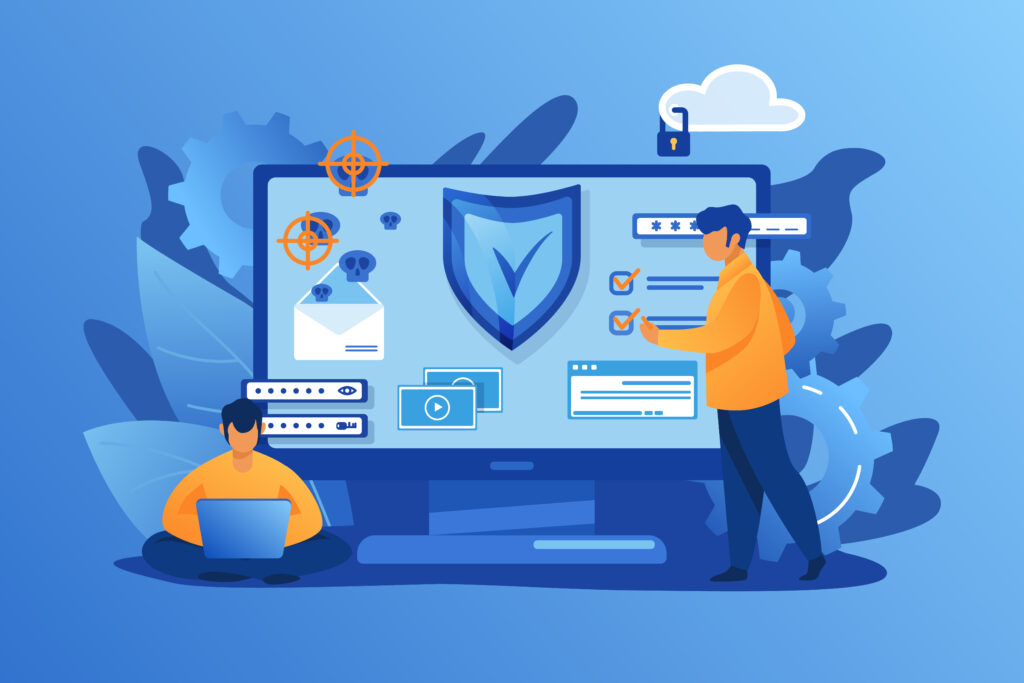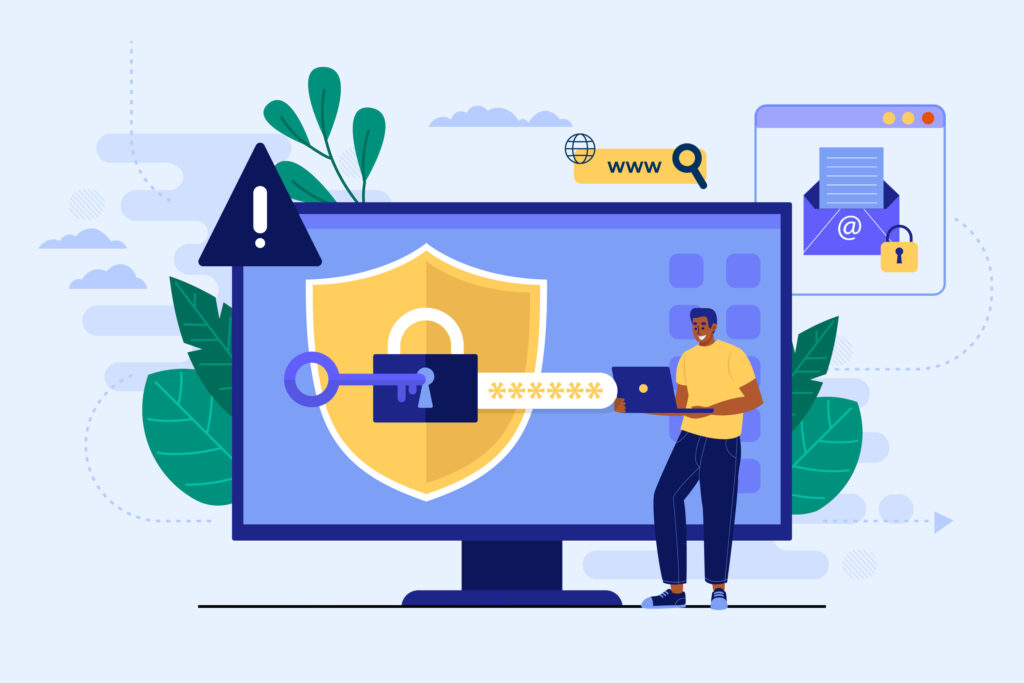Every website owner should consider WordPress security. Google adds around 10,000 malware-infested and 50,000 phishing sites to its blocklist daily and weekly, respectively. If you care about your website, you should take the WordPress security guidelines seriously.
Table of Contents
WordPress is built with security in mind and is frequently reviewed by hundreds of developers, but plenty may be done to ensure that your site is safe. So let us check out the details of how safe is a website on WordPress.
How Safe Is Website on WordPress?
How secure is WordPress website? WordPress is used by 63.3% of all websites as their Content Management System (CMS). This is not to say that WordPress is insecure; users’ lack of security understanding is often to blame for vulnerabilities. Thus, it would help if you implemented preventative security measures before hackers attack your website.
Factors That Can Impact WordPress Website Security

● Broken Passwords
Weak passwords are one of the most common errors website administrators and users make. If your password is easy to guess, hackers will easily break into your website. A brute-force assault is a frequent kind of cyberattack. Agents and bots do this exploit by trying various password combos until they succeed. They can bypass your site’s security by using your login form.
This is why you need solid passwords for all your WordPress users. A password generator is highly recommended, such as the one found on WordPress user profiles.
● Query Language, Structured (SQL) Injections
“database language” refers to the computer language known as Structured Query Language (SQL). MySQL databases are essential to the operation of WordPress websites. Cybercriminals may access your site’s data via a database using SQL injections. If hackers get access, they may modify your database in real-time.
For instance, if your WordPress installation allows additional admin users, hackers may utilize such accounts to get access to your site. New information, such as dangerous links, may also be added to your database. SQL injections often occur in submission, communication, and payment. Hackers will send malicious code into the SQL database instead of the data you requested in the form field.
Understanding The Risks And Vulnerabilities Associated With WordPress
● Older WordPress Installation, Add-Ons, Or Modifications
Outdated versions of WordPress core, plugins, and themes are typical sources of vulnerability. Updates are usually released by the WordPress security detail and plugin/theme developers when problems are discovered. However, this might alert hackers and fraudsters to security flaws in WordPress.
● Insufficient Verification and Security
Inadequate security measures and credentials provide another entry point for hackers. WordPress allows you to divide your site’s users into five distinct groups, each with its permissions and responsibilities: administrator, editor, author, contributor, and subscriber. The most potent accounts are administrator accounts, which provide hackers access to everything from the site’s data to the bank account from which e-commerce proceeds are withdrawn.
Security Measures For WordPress Websites
It’s always a good idea to review WordPress security recommended practices. WordPress is a safe CMS overall, but it has several serious flaws due to being open source. Your WordPress site can be protected if you take the necessary precautions.
1. Core Security Features Of WordPress
We will be zeroing down on a few crucial sections of the site. A site is like a virtual version of the human body. When one component fails, the entire system suffers.
● WordPress Requires Frequent Updates
WordPress’s quality and safety both increase with each new version. Every time a new edition comes out, several problems and security holes are patched. In addition, the WordPress core team will swiftly address any extremely harmful problem and implement a new, secure software version. Failure to update puts you in danger.
● Keep Frequent Backups Of Your Site
When you back up your site, you duplicate all the information on the site and store it in a secure location. In a disaster, you may restore its place from the backup copy.
A plugin is required to back your website up. Several reliable storage options are now available. For instance, for just $3.50 a month, Jetpack now includes built-in backup functionality.
2. Importance Of Choosing A Reliable Hosting Provider
● Enhanced Site Functionality
With reliable hosting, slow page loads will be outdated. Remember that the higher the site performance, the more involved the users are.
● Faster Reaction Time
Google has claimed that site speed is one of the variables affecting ranking. People now make snap judgements, and thus they want instant responses.
Visitors who wait too long to get the information they need on your site will likely leave for one of your rivals. With reliable hosting, you can expect instantaneous response times.
3. Importance Of Regular Maintenance And Updates
WordPress is a free and open-source software that may be used to create various websites, including blogs and online shops. Over time, however, it risks collecting garbage in the form of duplicate or damaged files. This might jeopardize your site’s functionality and even its survival.
Maintaining your WordPress site regularly is crucial to keeping it online and functioning correctly. In addition to reducing your workload, this will guarantee the site’s upkeep is done correctly.
Common Security Threats For WordPress Websites
In this part, we’ll go over some of the most frequent WordPress security flaws and how you can defend your site from them.
● Direct Physical Assaults
WordPress brute force assaults repeatedly try different username/password combinations until a working one is found. The WordPress login page is a common target for brute force attacks since it provides the most accessible entry point.
By default, WordPress allows unlimited login attempts, making your site vulnerable to brute-force attacks from automated programmes.
The sheer volume of failed login attempts caused by a brute-force assault is enough to slow down even the most popular websites. Some servers, particularly those offering shared hosting plans, may temporarily disable your account during a brute-force assault.
● Malicious SQL Injections
To function, your WordPress site must connect to a MySQL database. An SQL injection might allow a hacker to enter your WordPress dashboard by creating a new administrator account. Further information, such as links to malicious and spam websites, may be inserted into your database using SQL injections.
Strategies For Preventing And Mitigating These Threats
● Integrate a Content Delivery Network firewall
Bots and many other malicious actors may target any website. By recognizing and blocking malicious traffic before it hits the server, a CDN-level firewall provides an extra degree of protection. This may be useful for stopping distributed denial of service and other automated assaults.
● WordPress and Plugin Versions Should Be Removed
The methods that hackers use to get into websites are constantly evolving. It means inspecting your WordPress and plugin versions.
The Role Of Updates And Maintenance In WordPress Website Security

● Improved Search Engine Optimization
With SEO techniques, you may improve your website’s visibility in Google and other Search engines. Remember that a better position will put you among a more significant number of potential buyers. If your SEO is solid, you can:
● Raise product recognition
● Increase visibility
● Gain consumer confidence and loyalty
● Get your reputation up and running.
● Drive more people to your website.
● Maximize your leads and sales.
● Maximize your profit margins.
Your search engine optimization efforts will benefit from maintaining a current website. In reality, mobile-first indexing is currently used by Google for ranking purposes. Make sure your site is optimized for mobile use. Over 70% of businesses that shifted to a mobile-first strategy also experienced increased revenue.
● Keep Your Eyes on the Prize
You have your hands full every day with the consumers you’re assisting. You can’t afford to waste time investigating the problems affecting your website. Consider hiring a third party to manage your WordPress website instead. Your staff can maintain frequent website backups. They will also take care of updating any plugins or themes.
Best Practices For Keeping WordPress Websites Secure
● Get Rid of WordPress’s Extra Plugins and Themes
Less is more when it relates to unnecessary plugins. Even if they are deactivated and not being utilized, keeping unused plugins in the WordPress installation raises the likelihood of a breach. By deactivating unneeded add-ons, you may make WordPress less vulnerable to intrusion.
● Check the Safety of Your Plugins
There are a few key metrics you can use to evaluate the safety of WordPress themes and plugins:
Has the plugin and theme seen widespread adoption? When uploading a module to your WordPress site, look at the total number of installations.
● Is the number of reviews substantial, or is the mean rating high? Before installing a new plugin, ensure it has good reviews and ratings in WordPress.
● Do the plugin’s creators often provide updates and security patches? Insecure plugins that haven’t been upgraded in a while may be exploited to hack WordPress installations.
● Does the provider provide a privacy statement and terms of service? Check if the site has a duration of service or privacy statement.
● Does the seller provide an actual address in terms of service or on a contact page? A WordPress plugin with a real-world contact address is more trustworthy.
● Reduce Failed Login Attempts
This is an excellent approach to prevent hackers from using brute force to access your site. A plugin like Restrict Login Attempts may prevent unauthorized users from logging onto your site for twenty minutes after three failed login attempts.
● Use a Two-Factor Authentication System
Two-factor authentication is a terrific tool for bolstering the safety of your credentials. This second layer of protection may be considered a temporary secondary password that is changed every 2 minutes or so. To access the site, hackers must correctly guess your permanent login and the quick safety code within 30 seconds.
Addressing WordPress Security Concerns
The greater the number of people using WordPress, the more excellent the opportunity for hackers to exploit the platform. Millions of websites now use WordPress, so hackers and cybercriminals often attack the platform to exploit its weaknesses.
Steps To Take If You Have Concerns About The Security Of Your WordPress Website
● Remove Links
Someone “hotlinks” to your site when they utilize an asset (often an image) from your site on their own. It slows down your website and consumes server resources whenever someone clicks on a link to some of your material on another website.
● Altering the Default Database Prefix in WordPress
This is why SQL injection attacks are a common target for hackers. Bypassing WordPress’s security mechanisms and retrieving the database’s content is possible using this method, which injects malicious code into the database.
Best Practices For Addressing And Resolving WordPress Security Issues
● Keep Regular Backups
The importance of site backups to your security measures cannot be overstated. Like a house or car insurance, backups provide you peace of mind, but you always hope you won’t have to use them. You may quickly restore your site from a blockage in the improbable event of an effective security breach.
● Spend Money On Safe Hosting
Partnering with a safe hosting provider is essential to keeping a site safe from intruders. While looking for a host, it’s necessary to think about safety. In addition to doing regular virus scans, many servers also provide free SSL certificates, specialized firewalls, and other security-related services to protect your website.
Conclusion
So is WordPress website secure? Malware injection and distributed denial of service attacks are only two examples of cyberattacks. That’s why it’s so essential for WordPress users to know how to protect their websites.
Nevertheless, protecting a WordPress site is something you do only once and remember about. As cyberattacks are constantly changing, you need to evaluate them often. The possibility of harm will always be present, but it may be mitigated using WordPress’s security features.
Boost your online presence with our professional WordPress development services. Contact us now for a free consultation and bring your vision to life!